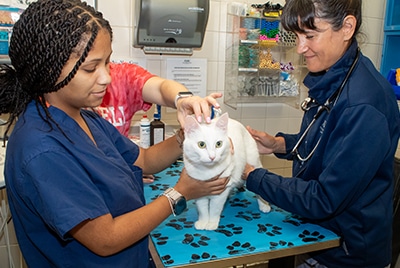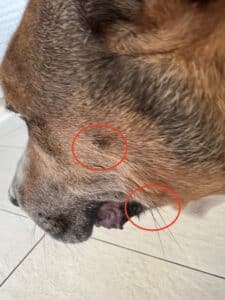Merkel Cell Tumors: What can Jimmy Buffett’s Cancer Tell Us About our Pets

Merkel Cell Tumors: What can Jimmy Buffett’s Cancer Tell Us About our Pets
The soundtrack of my college years went silent with Jimmy Buffett’s passing over Labor Day weekend. The cause of death was widely reported as a rare form of skin cancer called Merkel cell carcinoma. Animals also suffer from this rare form of cancer, so today I’ll discuss Merkel cell tumors in animals, in honor of Jimmy Buffett.
Why are they called Merkel cells?
Merkel cells are named after a German scientist, Dr. Friedrich Sigmund Merkel, who was a leading pathologist of the late 19th century. He is most famous for describing the microscopic appearance of the skin cells that bear his name today, among other publications and discoveries. Recently, a polyoma virus infecting Merkel cells has been associated with the development of Merkel cell carcinoma.
What do Merkel cells do?
Merkel cells are the skin cells responsible for our tactile sense of touch and feel. Technically speaking, Merkel cells function as mechanoreceptors. This means these cells sense pressure changes and transmit those sensations to a nerve. Thus, Merkel cells belong to the neurological pathway that produces our sense of touch.
Which animals have Merkel cells?

Merkel cells can be found in the skin of all animals with backbones (i.e. vertebrates). Vertebrates are widespread throughout the animal kingdom and include amphibians, birds, fish, mammals and reptiles. Hair follicles of whiskers and the long hairs on dogs’ and cats’ wrists and chins contain Merkel cells, giving these specific hairs a sensory function. Our canine model displays these tactile hairs in the photo accompanying this blogpost. Merkel cells in cats’ whiskers are responsible for the recommendation to feed cats from whisker stress free bowls.
Merkel Cell Tumors in Cats
Like in humans, Merkel cell tumors are rare in cats. In a study of nearly 700 Italian cats with cancer, not a single Merkel cell tumor was reported. Veterinarians from the Schwarzman Animal Medical Center reported on a feline Merkel cell carcinoma nearly 25 years ago. Although the reports of feline Merkel cell tumors are few, the cats sadly have a similar outcome to that of Mr. Buffett.
More interesting from a scientific perspective is the recent report of a feline papilloma virus in feline Merkel cell tumors. This finding suggests that a virus may play a role in the occurrence of feline Merkel cell tumor, as it does in people.
Merkel Cell Tumors in Dogs
Dogs are the lucky ones when it comes to Merkel cell tumors. These tumors are even less common in dogs than in cats. Canine Merkel cell tumors also have a more benign behavior than in cats or people. Surgical removal of the tumor typically cures the dog.
Not to ignore our large animal friends, a Merkel cell tumor that spread to other parts of the body was recently reported in the skin of a steer.
Worried about a lump on your own skin? The Mayo Clinic has excellent information on Merkel cell carcinomas.
Do you have a child who dreams of owning a microscope and being the next Dr. Merkel? Check out our Children’s Resource on Pathology.



































